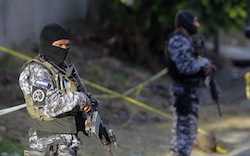The controversy over a new, proposed security tax highlights the deep divides over what path El Salvador should take in its ongoing fight against organized crime.
Treasury Minister Carlos Caceres and Justice Minister Benito Lara have both said that the government is preparing a proposal for a new security tax, reported ElSalvador.com. President Sanchez Ceren’s communications secretary also called for the new tax in a statement released June 18, stating that El Salvador cannot rely on loans and international assistance to fund security reform.
The remarks follow a recent ruling by El Salvador’s Supreme Court, which prevents the government from issuing bonds needed to borrow US$900 million. Some $96 million of these blocked funds would have been used for security programs.
Officials haven’t provided details on how much money the proposed tax would be expected to raise, nor what specific programs might be implemented with the increased funding. Lara said the tax would create a pool of funds dedicated to ongoing security reforms, similarly to how an existing tax on all gasoline sales goes into the country’s road maintenance and infrastructure fund.
Regionally, El Salvador is slightly above average in terms of tax collected as a percent of GDP, according to World Bank data. Across Central America, the average tax rate is 13.7 percent and El Salvador comes in at 14.5 percent, ahead of Guatemala (10.8 percent) and Costa Rica (13.6 percent), but slightly behind Honduras (14.7 percent) and Nicaragua (14.8 percent).
InSight Crime Analysis
Unsurprisingly, this proposal has sparked controversy in El Salvador, with business leaders arguing that what the government needs is a better plan for fighting insecurity, rather than a new tax. “We think that the resources are there, but they aren’t being used adequately,” one business leader told La Prensa Grafica.
The president has said that one of the core initiatives of his government, the National Council for Citizen Security (a security body made up of civilian and government representatives) will decide whether the tax is necessary.
SEE ALSO: El Salvador News and Profiles
While more funding would certainly help authorities combat historic levels of violence, the government hasn’t yet made a strong enough case for how such funding would actually be put to use. Another issue is whether the tax funds would be applied towards the more hardline and militarized approach pursued as of late, or if the government would make good on promises to implement more preventative security reforms.
Other countries in Central America have debated creating new taxes to fund security reform, with some success. Honduras did just that in 2011, passing a law that established a new taxation system. In 2014, Honduras collected some 1.9 billion lempiras (about US$86 million) via this security tax, double the amount collected in 2012 and 2013, according to El Heraldo.

